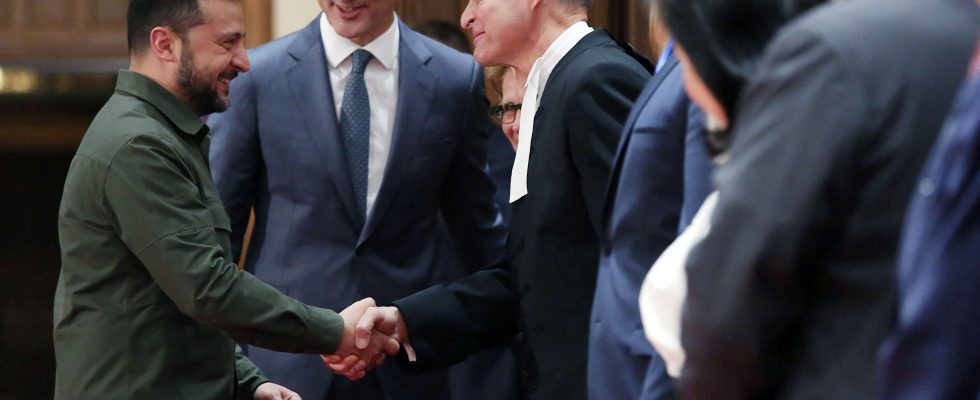This must have been the beautiful story that embodies a more than warm state visit. When this Friday, September 22, Anthony Rota, Speaker of the Canadian House of Commons, invites Justin Trudeau, Volodymyr Zelensky and all Canadian MPs to applaud a 98-year-old war veteran, Yaroslav Hunka, no one has the slightest idea of scandal that is about to explode in Ottawa.
Presented as a Ukrainian “hero” of the Second World War and fighter for Ukrainian independence from Russia, it is an understatement to say that Yaroslav Hunka’s CV is much less stellar. Very quickly, several associations, including that for the defense of the Jewish community in Canada, the Friends of the Simon Wiesenthal Center, revealed that the old man would have fought in the Nazi camp during the war, with the 14th Waffen Grenadier division of the SS. A Ukrainian corps directly under German command, also called “SS Galichina”, whose crimes against humanity during the Holocaust are widely documented. A gigantic blunder, which finally got the better of Anthony Rota’s position at the head of the Canadian House of Commons this Tuesday, September 26, after more than 48 hours of hesitation widely denounced by the Canadian opposition. “It is with a heavy heart that I rise to inform members of my resignation as Speaker of the House of Commons,” Anthony Rota finally declared, evoking “his deep regrets for his error”.
Moscow is rubbing its hands
The resignation of Anthony Rota could have put an end to this unfortunate episode. It did not happen. This Wednesday, Poland announced that it had opened an investigation with a view to a “possible extradition” of Yaroslav Hunka. The Polish Minister of Education asked the president of the Institute of National Memory IPN, responsible for investigating Nazi and communist crimes, to “urgently check in the documents whether Yaroslav Hunka is not wanted for crimes against the Polish people and Poles of Jewish origin”, adding that “the characteristics of these crimes constitute bases for requesting his extradition” from Canada.
But it was obviously from Russia that the reaction was quickly heard. Moscow did not ask for as much to put a piece back in its myth of “denazification” of Ukraine, the pretext for the invasion that began a year and a half ago now. Kremlin spokesperson Dmitry Peskov called on Canada on Wednesday to “bring to justice” Yaroslav Hunka, or to “hand over this criminal to those who want to do justice.” Russian propaganda media also commented extensively on this story, including the state newspaper Rossiyskaya Gazeta. The latter published an article titled quite simply: “The Kremlin declared that Zelensky’s applause to a fascist confirms Kiev’s Nazi ideology”, in which Dmitri Peskov, again, explains that “the regime’s addiction to Kiev’s Nazi ideology is not a new fact, we have been talking about it for a long time. The fact that Mr. Zelensky also gave a fascist a standing ovation confirms this once again.”
A hidden official visit
Obviously, Volodymyr Zelensky, himself of Jewish faith, would not have knowingly applauded a man who probably fought alongside the Nazis and could have taken part in the Holocaust. But this image was enough to eclipse the purpose of the Ukrainian president’s visit to Canada. Because while in the United States, the question of military aid to Ukraine is becoming more and more tense in the Republican camp and could even cause a possible “shutdown” of the country’s budget, the visit to the Canadian neighbor is It had so far gone off without a hitch. Ottawa had thus confirmed the signing of new aid of nearly 650 million dollars for the Kiev regime, a symbol of its unambiguous support since the start of the invasion of Ukraine.
But the images of Trudeau and Zelensky hugging each other and showering each other with praise – “Your fight is ours,” assuring the former; Canada has “always been on the right side of History”, abounding in the second – quickly faded into second place in the face of the scale of the blunder. And if the Canadian Prime Minister has nothing to do with this error, the latter has so far still not issued an official apology, hoping not to bear responsibility for this crisis. Or how a state visit that has all the makings of a good political move becomes in the space of an instant a very heavy ball and chain to drag around.
